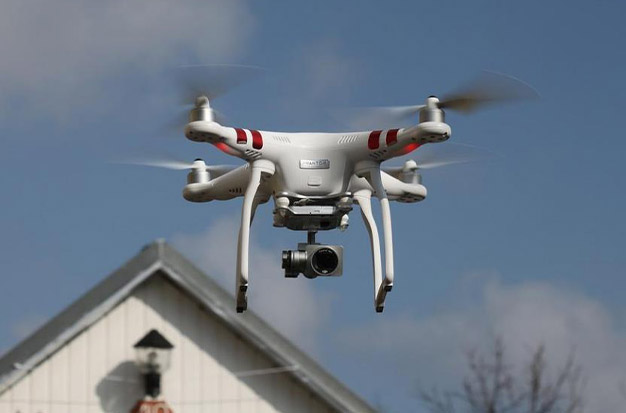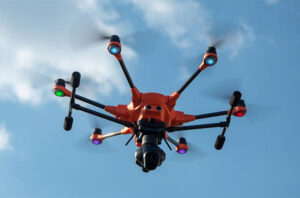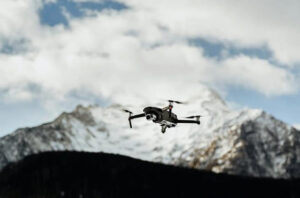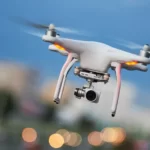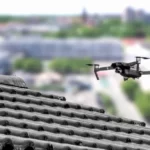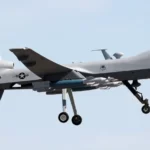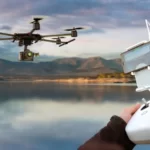More people are taking up the hobby of flying drones. Given how awesome drones are when they’re zooming through the air and pulling off amazing maneuvers, it’s hard to blame them. However, when some people overdo it with their drones, it can be annoying.
It’s one thing for your neighbor to fly drones, but it’s quite another when their drones begin to encroach on your property. It makes sense that you would become irritated at that point. But you need to educate yourself on the laws surrounding them before you do anything hasty, like shooting down your neighbor’s drone.
So, can you shoot a drone down? Here’s everything you need to know about the regulations governing airspace before you grab your shotgun and point it at the flying threat.
Table of Contents
Can I Shoot Down A Drone?
Even if a drone is flying over a person’s property, it is still prohibited to shoot it out of the sky. There are several reasons why shooting a drone is illegal:
- Shooting an aircraft is a federal crime
- Firing a weapon may be considered criminal mischief
- State and local laws may include additional restrictions for firing weapons
- Homeowners do not “own” the airspace above their properties
- Claiming self-defense is not a viable option
- The drone operator may sue the shooter in civil court
Under Title 18 US Code 32, the destruction of aircraft is a federal crime. The Federal Aviation Administration (FAA) classifies all types of drones as “aircraft.” Even recreational pilots must adhere to FAA guidelines when flying in uncontrolled airspace.
A person who shoots down a drone may also be charged with one or more state or local crimes in addition to a federal offense. For instance, a lot of places classify firing a weapon in public as criminal mischief. A charge of endangering the public or committing a property crime may also be brought against the person in some jurisdictions.
If a drone is shot down, a homeowner might try to justify the shooting. The airspace above a property, however, is not owned by the homeowner. The FAA believes that it has control over all airspace. In order to justify using self-defense, the homeowner must also demonstrate that the drone posed a threat of lethal force. The drone is not a lethal weapon unless it is carrying a weapon.
The homeowner must deal with civil laws after any applicable federal, state, and local laws. The drone operator may file a civil lawsuit against the homeowner for the theft of personal property. Shooting down a drone is entirely prohibited in the United States and probably in the majority of other nations due to the various legal repercussions.
Who Owns The Air Over Your Property?
Let’s go back in time to 1946 in order to more fully comprehend the response to this query. At that time, a chicken farmer named Causby in North Carolina sued the US government for invading his land and claiming that the government had violated his rights. Rather, in the space above his land.
You see, his farm was close to an airstrip that the US Army and Navy used. The glide path of the runway extended directly over Causby’s home and outbuildings. Fighter jets, bombers, and other planes routinely flew over the property, so as you can imagine, there was always quite a bit of commotion.
He claimed that the noise was so frightful that he was forced to abandon his successful chicken business because he would lose six to ten chickens every day when they flew into the walls in fear.
He and his family frequently couldn’t sleep at night due to the glare of the extremely bright lights and the noise of the flying airplanes. It would seem that he was entirely justified in bringing his lawsuit based on those mitigating circumstances.
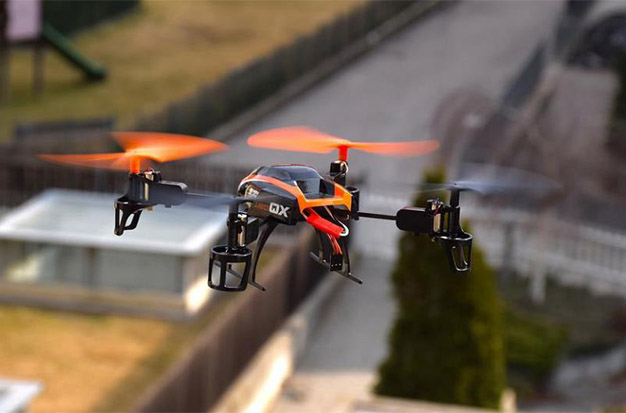
Can The Police Shoot Down A Drone?
The Federal Aviation Authority’s RE-authorization Act was passed by the federal government in 2018. There is a clause in the law that permits the government to shoot down privately owned drones if it thinks they pose a threat.
The federal government forbade law enforcement organizations from shooting down drones or attempting to jam their signals before the law was passed. Previously, police officers could only disable drones that endanger the public or fly over wildfires if they were in Louisiana or Utah.
Can I Point A Laser Pointer Or A Bright Light At The Drone?
Again, drones are considered to be aircraft, so if something is prohibited for an airplane, it is also prohibited for a drone.
What then can you do in regards to drones? Talking to the drone’s owner should be the first step after determining who owns it. Finding the operator of a drone is not impossible because drones fly close to their operators and have a limited amount of battery power. Getting law enforcement involved is preferable if they are unreasonable. You may be able to take legal action to stop the drone from flying over your house thanks to nuisance and peeping Tom laws that may be relevant.
Is It Legal To Jam A Drone?
It is against the law to jam any kind of radio signal. The use and sale of jamming apparatus that disrupts any authorized radio communications is forbidden by federal law. This includes attempting to block the signal between a drone and its pilot.
Transmitters and receivers are included with drones. Whether the interface is offered by GPS, WIFI, or a handheld controller, all communications are sent using radio waves of various frequencies. A signal on the same frequency as the drone is emitted by jamming equipment to interfere with communication. Jamming the drone’s signal could prevent other radio signals, such as police radios, from transmitting.
The drone cannot be controlled by jamming its signal. Drones are made to either of two things when a signal is lost. Depending on the situation, the drone will either land there or use GPS to find its home base.
How Can Drones Be Prevented From Flying Over Your House?
It is legal for drones to fly over private properties. However, operators are not allowed to fly drones carelessly under FAA regulations for drone operations. Unfortunately, when a homeowner complains that a drone operator is flying carelessly, the FAA is not likely to get involved.
When they observe erratic flying, homeowners are advised to get in touch with their local law enforcement agencies. It might be challenging for the homeowner to prove, though. Although there are few options available to homeowners for dealing with drones, there are a number of potential solutions.
First, the homeowner should ascertain whether the HOA or neighborhood association has any regulations prohibiting the use of drones over residential properties. In cases where drone flying is prohibited, law enforcement may step in to make the drone operator stop operating in the area.
Checking local laws for the definition of property boundaries is the next step. There may be existing regulations that specify “how high” a homeowner may erect structures on a residential property. Trespassing could be regarded as taking place if a drone is flown inside this area.
Trespassing on a property is possible for inanimate objects. A branch from a neighboring tree, for instance, is trespassing when it crosses the fence. There will be no repercussions for the homeowner if they remove it. If the homeowner has photographic proof of a drone flying inside the property’s defined boundary, they may complain to the local authorities. The drone operator could then be charged with trespassing on someone else’s property by the police.
Another choice is to file a complaint, claiming the drone operator is annoying people. A needless act that might prevent someone from enjoying their property reasonably is considered a nuisance. This could be the sound of blaring music coming from a car, shouting, or drone blades whirling.
A complaint claiming an invasion of privacy can be made as a final resort for stopping a drone. A homeowner has the right to complain if they believe that the drone operator is snooping on them, their loved ones, or their property. The judge might issue a restraining order if the homeowner can prove his or her case well enough.
Conclusion
No matter how intrusive and annoying it may seem, it is illegal to shoot down a drone.On the other hand, if you operate a drone, flying it in a restricted area could result in serious consequences for you. Law-related ignorance is not a valid defense. Therefore, familiarize yourself with aviation law and the dos and don’ts of operating unmanned aircraft systems.
Drones are likely to become much more pervasive in our lives, so while the information provided in this article is a great place to start, it always helps to speak with an aviation lawyer for any drone-related legal issues you may encounter.
